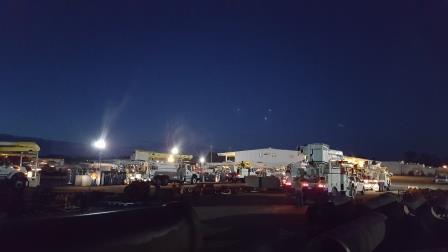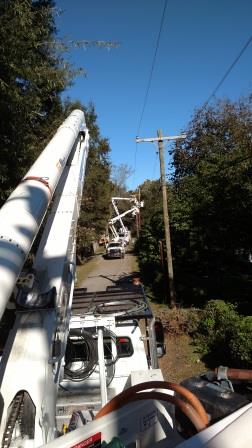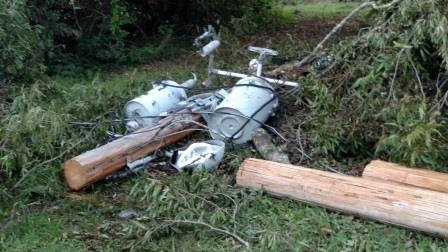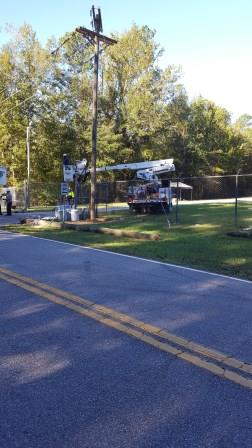The state's 21 "electric cities" sprang into action in the face of significant power outages caused by Hurricane Matthew. These utilities, which are all members of the South Carolina Association of Municipal Power Systems, activated their mutual aid network, allowing them to deploy manpower, equipment, and materials to help restore power to the hardest hit systems.

Linemen crews from various mutual aid cities mobilize at the
Orangeburg Department of Public Utilities Warehouse. Credit/Mike Jolly
The original purpose of SCAMPS when it was created in the 1980s was to serve as a vehicle for mutual aid during emergencies. Today SCAMPS, as an affiliate of the Municipal Association, also provides training for its members and advocacy related to utility issues that are before the Legislature.
Municipal-run electric utilities were established to provide a nonprofit, community-owned and locally controlled source of reliable electric power. Governance by an elected council or utility commission allows utilities to tailor their policies and any decisions affecting electric rates and system operations to meet the specific needs and priorities of the local community.
A hallmark of public power is system reliability. Having locally based utility employees allows for utility linemen to respond fast to resolve most power outages. When the magnitude of an outage exceeds local resources, SCAMPS utilities rely on a mutual aid assistance compact. The compact is a three-tier system consisting of a state and regional network coordinated by SCAMPS and a national mutual aid response system, which the American Public Power Association offers.

City of Clinton linemen help out in Bennettsville after the storm. Credit/Clinton
Six municipal utilities reported a combined total of approximately 25,000 customer outages in the wake of Hurricane Matthew. Three of the six affected utilities — Bennettsville, Georgetown and Orangeburg — requested assistance to restore power. Orangeburg was hit hardest, suffering approximately 15,000 outages.
The network activated all three levels to respond to widespread impact along the southeast coast. The SCAMPS mutual aid response involved approximately 140 people, including member-utility employees, private utility or tree company employees, and more than 50 public power employees from utilities in Alabama, Florida, North Carolina and Nebraska. About 120 people were deployed to Orangeburg, while the rest helped in Bennettsville and Georgetown.
Mutual aid workers are some of the least-recognized heroes of catastrophic weather events, including Hurricane Matthew. The majority of these crews worked for a week away from home, enduring 16–18 hour days, difficult working conditions and less than ideal accommodations.

Storm damage in Bennettsville called for a mutual aid response. Credit/Clinton
In addition to Matthew, South Carolina's ice storms in 2014 and 2015 triggered limited in-state mutual aid responses. SCAMPS also participated in a national mutual aid deployment in support of the Superstorm Sandy recovery effort in 2012 along the northeastern U.S.
Until tested by an actual event, it is often difficult to know if plans will work. The deployment for Matthew proved that the three-tier system was up to the challenge. SCAMPS had a 100 percent response by the utilities that employed more than five linemen and weren't seriously affected by the storm. Regional and national network resources readily supplemented in-state resources.

City of Rock Hill linemen assist in the City of Orangeburg. Credit/Mike Jolly
